- Home
- Peter Ackroyd
The Casebook of Victor Frankenstein Page 5
The Casebook of Victor Frankenstein Read online
Page 5
“Still, I pity her.”
“For what reason?”
“Look around you. Do you see the squalor? It would be easy, in such a place, to slip into crime and evil.”
“Yes. It is wretched enough.” Bysshe seemed very tired.
“Wretched? It is monstrous. And it will create monsters. Have you ever seen such squalor?”
Bysshe had murmured something in reply, but I had not listened. “What was that?”
“I said, did you see the father?”
“He was on the stairs. He is no threat.”
“Threat?”
“Forgive me,” I replied. “My mind is wandering.” Yet I believed that Mr. Westbrook considered me to be his family’s enemy.
I ATTENDED LESSONS EVERY MORNING at the dissecting room of St. Thomas ’s Hospital. I gained admission, as a voluntary student, by paying a trifling fee for a course of lectures I never attended. I wanted only the practical work of cutting. Theory and conjecture were not sufficient for me. The only road to knowledge lay in the examinations of the dead. I was obliged to observe, and to experiment, before I arrived at any reasonable opinion.
The dissecting room was not a place for the fearful or the faint of heart. The corpses were placed on the dissection tables, in the middle of the room, with six or seven students intent upon rummaging about their bones and entrails. Some concentrated on an arm, others on a leg or bowel. Many of the bodies had been laid out several days before burial, and many had been dug out of the ground in a state of partial decay. Yet, if the flesh was infirm, the bones were generally still sound.
There were glass cases ranged along the walls with bodily specimens of every conceivable kind. In a large fireplace, on one side of the room, stood a copper pan that was used for boiling the bodies when the work of the knife became too slow. The bones could then be wrenched from the boiled flesh with ease. I had not yet grown accustomed to the smell of rotten or rotting flesh, but its savour did not offend me. When mixed with the smell of the preservative it had a piquant aroma that lingered on the hands, the arms, and even the clothes of the dissectionists, long after the class was over. There were some who shunned the smell, when they detected it upon our frock-coats. There were some, entering the dissection room for the first time, who fainted dead away. Others retched violently, and left the content of their stomachs on the floor among the entrails and faeces of the dead. The stench of death is equivalent to death itself. It is the darkness of fear, the unknown agency, the dissolution of hope. Yet if I were able to conquer death, what then? The stench of death might then become a wonderful perfume!
Among my fellow dissectionists was a young man of bright eye and ruddy complexion. I gathered from his speech that he was a London boy, but he had given up his trade as an ostler on the City Road to become an apprentice surgeon. “I am used to the stink of horses and of London inns,” he told me. “The dead don’t bother me.” We would drink together in the local public house where the other dissectionists congregated; the bar consequently smelled of the charnel house, and was not patronised by many other visitors. Jack Keat and I would sit at a low wooden table, and converse on the events of the day.
“You were holding in your hand, Victor, a very good cancer.”
“Of the bowel. Extraordinary corruption. It was difficult to hold secure.”
“You have to use your thumb and forefinger. Like so. You may get something stuck beneath your nail. But it will wash out.”
“You were in a very good humour.”
“I found a tumour eating its way through a brain. It was oozing. I cleaned it out and kept it.” He patted his pocket.
He was short enough, and one or two drinks would send him, as he put it, “up the Monument.” He would declaim lectures and speeches he had read. He recited passages from the poetry he most admired. I remember that he had an especial passion for Shakespeare. “This is where the future is being made,” he said one evening. “Here. In the dissection room. This is where we will find improvement. Progress. This is where we can alleviate human suffering and disease. You and I, and all our fellows, must work with ardour for the common cause! We must be energetic, Victor. We must be confident.” And then he broke down in a fit of coughing.
5
I RETURNED TO OXFORD two days before the beginning of the Hilary term; Bysshe urged me to stay in London, citing the radical enterprise with which he had become associated and remonstrating with me about my lack of fervour for the cause (as he put it). But in truth I was eager to renew my own studies. I had seen and heard much in London, but nothing had impressed me so profoundly as the electrical demonstrations of Mr. Davy. I burned with impatience to consult all the volumes of physical science, ancient and modern, thereby to discover the secret springs of life; I wished to dedicate myself to this pursuit, to the exclusion of all else, and I believed that no power on earth could divert me from my purpose.
When I entered the college I greeted the porters as old companions, although their welcome for me was slightly subdued; I was still too much associated with Bysshe to be wholly accepted. Yet my college servant seemed genuinely pleased by my return. “Oh, Mr. Frankenlime,” she said, “not a moment too soon.” She had much difficulty in pronouncing my last name, and would try several different expedients in the course of one conversation. “I had ever so much trouble with your bottles.”
“I would hate to put you to any inconvenience, Florence.”
“Them bottles were filled, half-filled and not filled at all. I didn’t know where to put them in the general clean.”
She was referring to the experimental laboratory I had set up in my bedroom. It was a modest affair-some crucibles, tubes, and a portable burner-but she had a nervous dread of anything she called “medicinal.” For some reason it reminded her of her husband’s untimely death, an event which she took much pleasure in describing to me in all its detail. “I left them where they was,” she said. “I did not touch them, Mr. Frankentine.”
“That was very good of you.”
“I never touch my gentlemen’s properties. Oh, no. Did you have a good journey from Old Smokey?” She was a Londoner by birth, as she never ceased to inform me, but she had married the short-lived Oxford man and had never moved away. “I suppose there was a good fog.”
“Much rain, Florence, I’m afraid.”
“I am sorry to hear that.” She seemed delighted that the city continued to suffer from bad weather. “But it clears the fog, you see.” She lowered her voice to a whisper. “How is Mr. Shelley?”
“He is very well. He flourishes in London.”
“He is often spoken of here.” She was still whispering, although there was no one to overhear us. “He is considered wild.”
“He is not savage, Florence. He is very thoughtful.”
“Is that what you call it? Well.” She took my trunk, and hauled it into the bedroom where she began to unpack my shirts and general linen. “Whatever is this?” I heard the question, and knew at once what she meant. I had placed for safekeeping among my linen a small model of vitreous clay; it was a simulacrum of the human brain, perfect in all of its details, that I had purchased from an apothecary in Dean Street. He had told me that it was a copy of the brain of one Davy Morgan, a notorious highwayman who had been hanged a few months before.
“It is nothing, Florence. Leave it on the table.”
“I will not touch it, Mr. Frankenline. It is worm-eaten.”
I went into the bedroom, and picked up the model. “These are not worms. These are the fibres of the brain. Do you see? They are like the channels and currents of the ocean.” How slight was the knowledge of the human organism! There was not one person in a thousand-a hundred thousand-who had stopped to consider the workings of the mind or of the body.
“It isn’t natural,” she said.
“It is nature itself, Florence. I believe that to be the optic lobe.”
“It is no good telling me things like that, sir.” She looked at me in horror. “I
want nothing to do with it.”
“If we could stimulate that area, then we might see for many miles. Would that not be an advantage?”
“It would not. With your eyes popping out of your head? Oh dear, no.”
I put the model on the work-table I had set up by the window of the room. “I am afraid that you will remain in ignorance, Florence.”
“At least, sir, I will be happy.”
It did not occur to me then that Florence ’s words expressed some instinctive truth; the natural sentiments of mankind, however coarsely expressed, have a justice of their own. But I had already separated myself for ever from the ordinary pursuits of men. My mind was filled with one thought, one conception, one purpose. I wished to achieve more, far more, than those around me and I fully believed that I would pioneer a new way, explore unknown powers, and unfold to the world the deepest mysteries of creation.
I read widely in the libraries of Oxford, straying very far from the directions of my moral tutor who seemed to know nothing beyond Galen and Aristotle. Once a week I climbed the stairs to Professor Saville’s rooms, across the quadrangle from my own, where I always found him sitting in a high-backed chair with a tumbler of brandy and cold water by his side. My early education in Geneva had given me a sufficiency of Greek and Latin, so that the weekly requirements of translation caused no difficulties for me. I had already informed him that my interest lay in the growth and development of the human frame, at which he seemed genuinely astonished.
“It is not a pursuit,” he said, “that I associate with gentlemen.”
“But if gentlemen do not venture upon it, sir, who will?”
“Are there not anatomists in the world?”
“I am concerned with the workings of human life. What subject is of more importance?”
“Surely Galen and Avicenna have informed us on all such matters?” Saville had a habit of rising from his seat, after delivering an opinion, and then walking around the room before resuming his position. Only then would he take a sip from the tumbler.
“I believe, sir, that Galen used the anatomy of a Barbary ape?”
“Quite satisfactory.” He took another tour of the room. “You are not suggesting that we defile the human temple?”
“How else can we learn from where the principle of life proceeds?”
“You need only open your Bible, Mr. Frankenstein, to be assured on these matters.”
“I know the Bible well, sir-”
“I very much hope so.”
“But I confess myself ignorant of the actual mechanism.”
“Mechanism? Whatever do you mean?”
“We learn in Genesis, sir, that God formed man out of the dust of the ground and then breathed into his nostrils the breath of life.”
“What of it?”
“My question is, of what did that breath consist?”
“You have been too much in the company of Mr. Shelley.” He began another perambulation of the room and, on his return to his chair, swallowed a large portion of brandy and water. “You are beginning to doubt Holy Scripture.”
“I am simply curious.”
“Never be curious. It is the path to perdition. Now, shall we turn to the subject at hand?” He began to examine my translation into Greek of an editorial from The Times, on the prospects for Dalmatian independence, and I left his chambers soon after.
SO THERE WAS TO BE NO ENLIGHTENMENT for me at Oxford. I had already determined to study enough to attain my degree, principally for the sake of my father, but like a pilgrim I prepared myself for another journey. The mind that is ambitious makes itself. I found a small barn outside Oxford, in the little village of Headington; I rented this from a farmer for an inconsiderable sum, on the understanding that I was a student of medicine who was mixing noxious chemicals and combinations that needed to be prepared away from the haunts of men. The barn was surrounded by open fields, but had the advantage of a small track leading towards it. It was, as I told him, ideal for my purposes. And so it proved.
I began my experiments on the animal kingdom without, I hope, inflicting unnecessary or excessive pain. I had learned, from my studies of Priestley and Davy, the effectiveness of nitrous oxide as a means of anaesthesia; and I already knew the sedative effect of henbane when administered in large quantities. Yet I began with the smallest creatures. Even the humble worm, and the water-beetle, are objects of wonder to the student of Nature. Under the microscope the fly became a chamber of delights: the vessels of the eye were lustrous and brimming with life, crystals with manifold gleamings. How complex, and yet how vulnerable! All was held in such delicate poise and balance that the breadth of a hair separated life and brightness from darkness and nonentity.
I purchased turtle doves and other birds in the market off Corn Street and, when I felt the quick breathing warmth beneath my fingers, I sensed the elusive pulse of life. Was it the same warmth that suffused the mechanism of the voltaic batteries? Warmth meant motion and excitation, and movement visible or invisible was the condition of life itself. I believed that I was on the edge of a great discovery. If I could create movement, would it not then reproduce itself in sequence just as the waves beating against the shore rise up in harmonious array? The world followed one dance.
I was suffused with such hope and enthusiasm, in those Oxford days, that I would often run through the fields beside the barn in sheer overabundance of energy. I could look up at the clouds rolling above me and see within them the patterns I discerned in the pearly iridescence of a fly’s wing or the shifting colours in the eye of an expiring dove. I considered myself to be a liberator of mankind, freeing the world from the mechanical philosophy of Newton and of Locke. If I could find one single principle from the observation of all types of organism, if in the study of cells and tissues I could detect one presiding element, then I might be able to formulate the general physiology of all living things. There is one life, one way to live, one energetic spirit.
Yet there were periods of my existence when, in the last reaches of the night, I awoke with horror. The first hours of the day provoked in me alarm, and I would rise from my bed and pace through the dark streets as if they were my prison. On the first faint appearance of dawn, however, I became calm. The low and even light, across the water meadows, filled me with a sensation akin to courage. I needed it more than ever. I had begun my anatomy of dogs and cats, purchased at small expense from the poorer people of Oxford. I told them separately that I needed the creature to catch the mice and rats in my lodging, and they parted with it willingly enough. It was easy to sedate the animal with nitrous oxide, and I calculated that the heart would beat for thirty minutes before it relapsed into a painless death. In those few minutes I began the process of dissection, turning the floor of my experimental theatre into a pool of blood. But I persevered in my course. I wished to prove that the organs of the creature were not distinct entities, but depended for their efficacy upon the interdependence of them all. Thus if I hindered the workings of one, then the others would be harmed or damaged in some fashion. And so it proved. I was making such strides in my experimental philosophy that I could see all difficulties falling away.
IN THE WEEK BEFORE THE END of that term I received a letter from my father in Geneva, informing me that my sister had become gravely ill. Elizabeth was my twin in all but name. We had grown up in each other’s company. We had played together from infancy and, although we had not studied together, I had acquainted her with the import of my schoolbooks. We were said to resemble each other in features, too, and both possessed the same nervous and restless temperament.
I made plans to return home immediately. There was a packet boat leaving for Le Havre from London Bridge on the Monday following, and I travelled to London two nights before to arrange my ticket. I had hoped to see Bysshe, of course. He had not communicated with me since my departure from the city, and I was eager to learn of his adventures in my absence. I walked into Poland Street soon after my arrival, but there was no light
at his window. I called up to him, but no answer came.
I had hired a small cabin on the boat to Le Havre, but it smelled so strongly of brandy and camphor that I was happy to spend much of the voyage on the open deck. The journey downriver was uneventful enough, apart from the sight of the great number of vessels that seemed like a forest of masts slowly moving past, but I was much struck by the flat marshes of the estuary near the mouth of the Thames. The isolation and loneliness of this region (which, as a passenger told me, was shunned because of the ague), stirred my spirit. I think that even then I had some faint intimations of my future labours, and of the necessity for secret and silent work far beyond the haunts of men. Had I not begun that course in the fields outside Oxford? Yet as I sailed away from England, I did not foresee that I was destined to become the most wretched of human beings.
My journey took me overland by coach from Le Havre to Paris; from there I travelled on to Dijon, and so to Geneva. I was impatient to see my sister, but was obliged to change horses and rest overnight in Paris. I arrived in the early evening at an inn along the Rue St. Sulpice and, after the recent interdiction of travel between France and England, the proprietor was delighted to receive my English companions. He called together a small number of musicians, who played in the courtyard, while his wife and daughters danced a Polish mazurka before us. Such is the warmth of Gallic hospitality, about which so many libels are spread in neighbouring countries. I was to share my chamber with an Englishman travelling on business, Mr. Armitage. He was selling spectacles, lenses and such like. He was the one who had warned me of the ague upon the estuary, and he had already regaled me with several stories concerning the trade in optical goods before I decided to take the air.

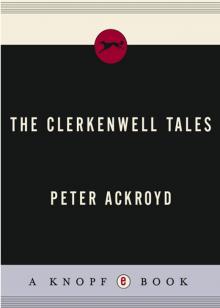 The Clerkenwell Tales
The Clerkenwell Tales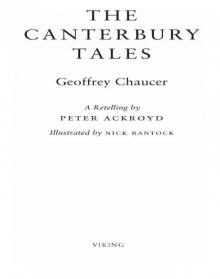 The Canterbury Tales
The Canterbury Tales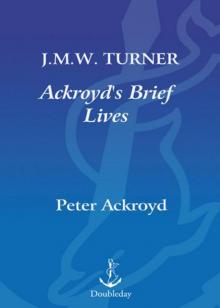 J. M. W. Turner
J. M. W. Turner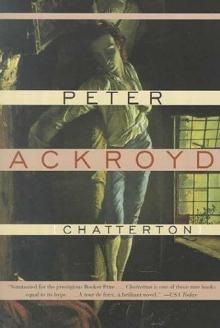 Chatterton
Chatterton The Canterbury Tales – A Retelling
The Canterbury Tales – A Retelling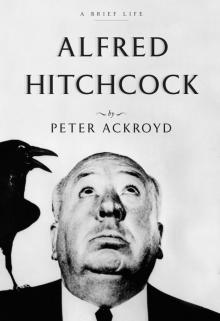 Alfred Hitchcock
Alfred Hitchcock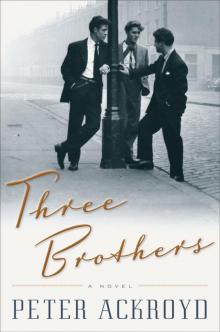 Three Brothers
Three Brothers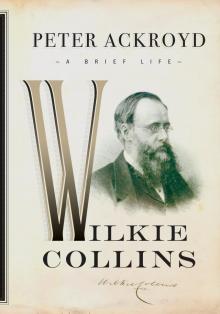 Wilkie Collins
Wilkie Collins Venice
Venice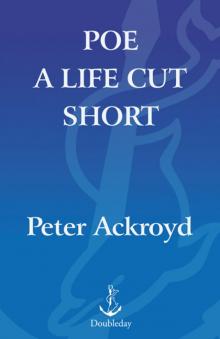 Poe
Poe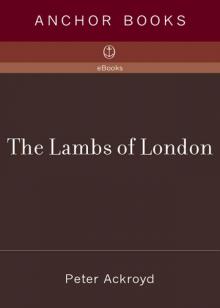 The Lambs of London
The Lambs of London London
London Queer City
Queer City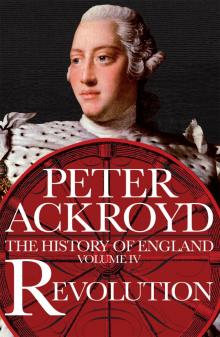 Revolution, a History of England, Volume 4
Revolution, a History of England, Volume 4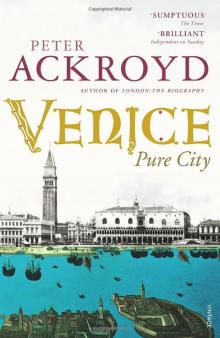 Venice: Pure City
Venice: Pure City Foundation
Foundation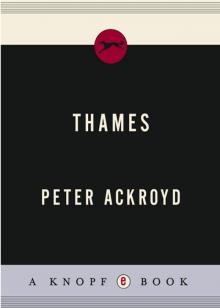 Thames
Thames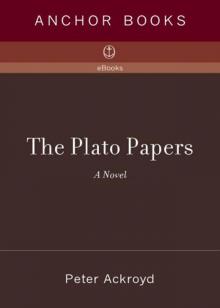 The Plato Papers
The Plato Papers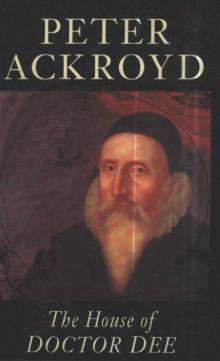 The house of Doctor Dee
The house of Doctor Dee Rebellion: The History of England from James I to the Glorious Revolution
Rebellion: The History of England from James I to the Glorious Revolution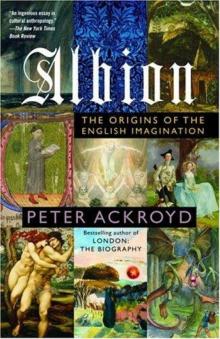 Albion: The Origins of the English Imagination
Albion: The Origins of the English Imagination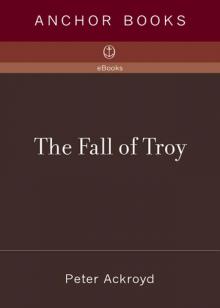 The Fall of Troy
The Fall of Troy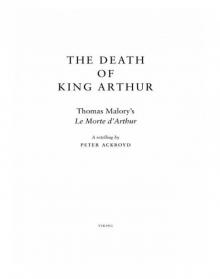 The Death of King Arthur
The Death of King Arthur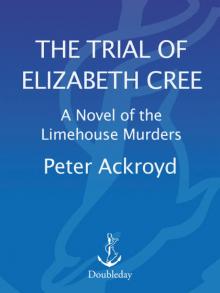 The Trial of Elizabeth Cree
The Trial of Elizabeth Cree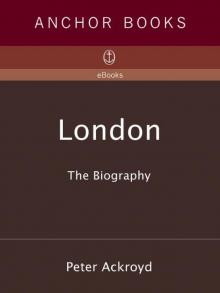 London: The Biography
London: The Biography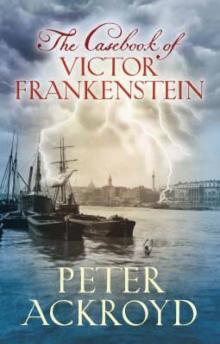 The Casebook of Victor Frankenstein
The Casebook of Victor Frankenstein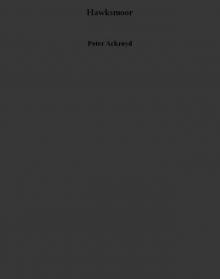 Hawksmoor
Hawksmoor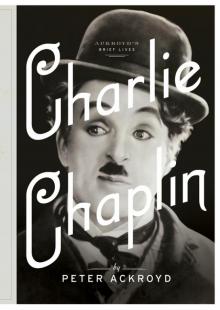 Charlie Chaplin
Charlie Chaplin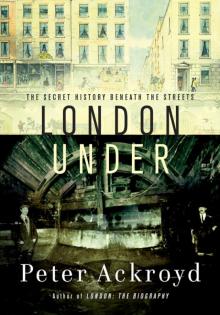 London Under
London Under